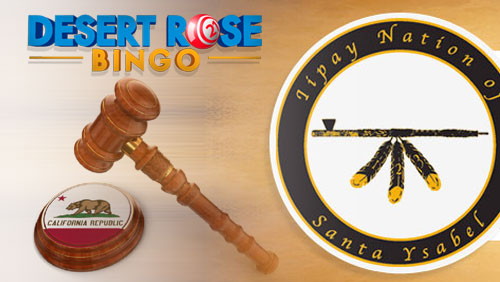The Iipay Nation of Santa Ysabel released a statement Monday after the U.S. District Court for the Southern District of California ruled against the tribe’s sovereign right to offer Class II bingo games to California residents.
 Late last week, Judge Anthony J. Battaglia granted the State’s request for a Temporary Restraining Order (TRO) that would temporarily suspend the Tribe’s operation of its browser-accessed proxy play bingo enterprise Desert Rose Bingo within California, forcing the suspension of the site, which went live on November 3rd.
Late last week, Judge Anthony J. Battaglia granted the State’s request for a Temporary Restraining Order (TRO) that would temporarily suspend the Tribe’s operation of its browser-accessed proxy play bingo enterprise Desert Rose Bingo within California, forcing the suspension of the site, which went live on November 3rd.
The nature of Battaglia’s basis for granting the TRO also implies that the Santa Ysabels are not likely to be able to offer online poker for real money, either, pending regulatory approval by state or federal authorities. The reason, as Battaglia excerpted from the Indian Gaming Regulatory Act’s statutory definitions, is that the form that bingo takes in being translated into an online offering makes the game a prohibited Class III electronic “facsimile” of real bingo.
“We are deeply disappointed by the federal court’s decision to grant the State’s TRO,” said Cruz Bustamante, spokesman for Santa Ysabel Interactive, the Tribe’s economic development enterprise. “This decision poses a significant threat to tribal jurisdiction over Class II gaming under [IGRA]. It declares one-touch bingo and proxy play of games to be illegal and turns a blind eye to federal laws and precedent permitting technological advancements to aid in the play of Class II bingo. These are very dangerous and significant pronouncements for Indian Country.”
Federal laws governing gaming on Tribal lands did not exist prior to IGRA. For the first time, the IGRA set the legislative basis for regulating Indian gaming nationally. The law encouraged economic development on Tribal lands and established gaming as a means of generating revenue for Tribes.
“If the State ultimately prevails on these important tribal sovereignty issues, the ultimate losers will be small, economically disenfranchised tribes in California and throughout the country,” continued Cruz. “We remain hopeful that as the case progresses the court will make every effort to understand the game and its technology, ultimately realizing that the games being offered are by definition legal Class II games.”





